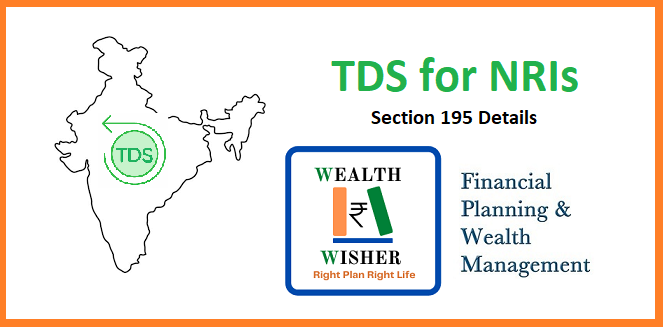NRIs are subject to TDS on income that is earned or accumulated in India. This income is offered for taxation hence certain rules under Section 195 of Income Tax, decide TDS for NRIs. But as the source of income can vary, so are the rules and rates of TDS for NRIs.
There are 2 sections- Section 192 & Section 195 that decide TDS or Withholding tax rates. Section 192 is for Salary. And for other incomes, Section 195 is applied. In today’s article let’s study the NRI TDS Rules under Section 195.
Section 195 of the Income Tax Act covers Tax Deducted at Source (TDS for NRIs) on payments made by NRIs. The rate & conditions for TDS is different for the resident &non- residents of India.
The first point to remember is income is not always free in India. Since tax applies, so is the TDS.
Understanding TDS for NRIs as per Income Source

- Bank deposits
We all know that interest earned on NRE (Non-Resident External) and FCNR (Foreign Currency Non- Resident) accounts are not liable for taxes in India. Hence, there would be no TDS.
But income earned on the NRO (Non-Resident Ordinary) account then, is liable for taxation and is also subjected to TDS of 30% without any basic exemption limit.
- Other Deposits
Fixed income instruments like corporate deposits and bond investments by NRIs are subjected to TDS at 20%.
-
TDS on Dividends Received by NRIs
The dividend is taxed in the hands of an investor. In case of a shareholder qualifying as a ‘non-resident’ in India, dividend income is taxable at 20% plus applicable surcharge and 4% health & education cess (maximum marginal rate of 28.5% i.e. 20% income tax + 37% surcharge applicable if income exceeds ₹5 crores) on a gross basis.
In the case of ‘non-resident’ shareholders, the slab benefit of ₹2.5 lakh is not available for dividend income. A TDS of 20% will apply. In case, you want to claim a lower rate under the DTAA, you will need to obtain a tax residency certificate from the host country tax authorities, complete Form 10F, and provide the necessary declarations to the Indian dividend-paying company.
- Capital Gains on Securities
If an NRI earns short-term capital gains by selling equity shares or equity mutual funds, the gains are subject to 15% TDS.
Long-term Capital Gains on equity shares or equity mutual funds, Debt mutual funds, corporate debentures are subjected to TDS at 10%.
Short-term capital gains on debt MF & corporate Debentures will be subjected to TDS of 30%.
Long-term capital gains on assets like house property or gold are subjected to a TDS of 20%.
Short-term capital gains on assets like house property or gold are subjected to a TDS of 30%.
-
Rent (When Received by NRI)
There is no separate rate that has been prescribed for TDS on rent paid to NRIs. The rent of the property that is owned by the NRI under the category of other income and is subjected to the TDS of 30%. The payer of the rent is responsible for deducting the tax source. The process of TAN and issuing a TDS certificate applies here.
6. Income by way of royalty payable by Government or an Indian concern, Income by way of royalty, not being royalty of the nature referred to be payable by Government or an Indian concern, Income by way of fees for technical services payable by Government or an Indian concern – TDS of 10%
- Any other income
Any other income that NRIs have earned which is liable for taxation in India is subjected to a TDS of 30%.
Is TDS a final Tax Rate?
No. The tax for NRIs will be deducted at the source of a certain income earned in India. But at the same time, NRIs will have to refer to the Double Taxation Avoidance Agreements (DTAA) that India has signed with various countries to avoid paying taxes twice. The DTA provides further concessional rates of TDS for NRIs. NRIs can even get a TDS waiver if the total income is less than a basic exempt limit.
What if you do not comply with TDS for NRIs Rules?
In case the tax is not deducted at the source, it leads to the disallowance of that expense under section 40 (a) (i).
When TDS has been deducted but not deposited within the time limit, an interest rate of 1.55 per month including the part months will be levied as a penalty.
If TDS is deducted but not paid at all, a penalty equivalent to the TDS amount will be levied.
In cases where short or partial TDS is deducted, the difference between TDS deducted and to be deducted will be levied as a penalty.
NIL TDS Certificate
The NRI can apply for NIL TDS Certificate based on certain conditions. This is applicable more in case of NRIs with business in India. This is an advanced topic and we will cover it some other time. A NIL TDS certificate is obtained by meeting conditions like:
- No default in past on tax, interest & penalty.
- The business life of 5 years.
- Assets exceed Rs 50 lakh.
- Filling all returns in past.
Can NRI claim TDS as a Refund?
Yes. This is done by filling ITR. Income Tax Returns (ITR) filing last date is 31 July of the year.
Is obtaining TAN compulsory to deduct TDS for NRIs?
Yes. All in the category of “payers” need to have a TAN before making a payment to NRI. These can be individuals, HUF, Firms, and Companies, etc. NRI would need the TAN of the deductor when he files returns.
What exchange rate will apply to TDS?
The exchange rate of RBI on the day of payment will apply to the TDS.
Hope this answers your questions about Section 195 dealing with TDS for NRIs. Do email me your specific queries at madhupam@thewealthwisher.com








